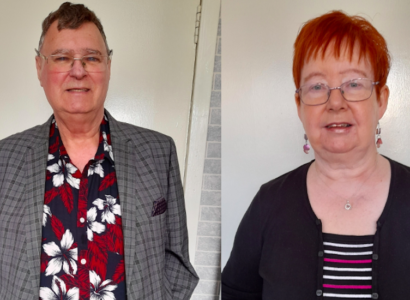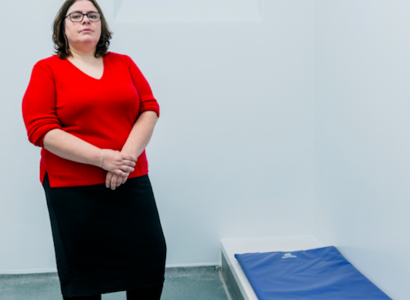Imagine my excitement when the offer came from the National Preventive Mechanism (NPM) for a fully funded place to attend the 5th Annual Meeting on Torture Prevention for National Preventive Mechanisms and Civil Society Organisations which was to be held in Warsaw, Poland! Ho ho, what a jolly I hear you say! Well, I realise I am incredibly lucky to have been given this opportunity (if anyone wants a travel review of Warsaw, please let me know – spoiler alert, it’s amazing), but we were there primarily to work, and I am incredibly grateful to have been able to go, learn from others and share our experiences.
Independent Custody Visitors (ICVs) provide an excellent, wide ranging and vast source of feedback on police custody in the UK, and I was there to represent independent custody visiting on an international stage, as well as having been involved as an active member with the UKNPM for 5 years. ICVA currently sits on the steering group and I attended along with Sam Gluckstein the interim Head of Secretariat for the UKNPM. Massive thanks to the NPM, and to ICVA’s CEO for enabling my attendance.
The meeting comprised primarily of representatives of NPMs from around 20 countries and had a focus on use of force in police custody, the preventive mandate of monitors in places of detention and looking at the Optional Protocol to the Convention Against Torture and Other Cruel, Inhuman or Degrading Treatment or Punishment or OPCAT. The United Nations General Assembly adopted the OPCAT in Dec 2002 and delegates at the 5th annual meeting were invited to consider the impact of OPCAT 20 years on. If you would like a little overview of OPCAT and the UKNPM, there is a briefing for schemes and ICVs here with some additional detail.
There is so much I can say about the two days, and I will blog further on the Istanbul Protocol, the Mendez Principles and reflections on the NPM in the forthcoming weeks but for now, I want to turn my attention to the discussions on use of force in policing as one of the substantive areas of the meeting.
There is no international definition of what a use of force is, but commonalities across delegate countries were that the use of force must always be in pursuit of a legitimate aim, must be justifiable in that pursuit, and must be proportionate to any risk posed. In order to understand what might be justifiable and proportionate it is worth considering what a legitimate aim might be, and the Committee for the Prevention of Torture (CPT) member fed back that those could be for the safety of the detainee, for the safety of others present or to prevent escape. He noted that the level of force used must be the lowest level of force to attain that objective. It would not be considered proportionate for example, if other, less intrusive or potentially harmful methods of force had not been considered. To use force outside of these legitimate aims, or to use excessive force could constitute ill treatment or torture of the detainee.
Whilst it was noted that most ill treatment occurs at the point of apprehension rather than detention, some of this ill treatment can spill over into custody. The CPT visited the UK in 2021, and produced a report from the visit which you can read here, which contained concerns regarding excessively tight handcuffing.
Put in an international context, the CPT stated that one third of countries in the Council of Europe have significant torture/ill treatment concerns of varying types. These actions are most notably recorded as being during the interview process as part of detention but, as noted in the UK report, can occur elsewhere in the detention process, and require effective monitoring in order to prevent ill treatment in future.
There were some key themes discussed amongst speakers and delegates regarding use of force and police custody:
- Preventing use of force in the first place – are custody staff effectively trained on de-escalation techniques and have the number of staff required to enable them to use the techniques fully without competing demands on time?
- Safeguards and recording where force is used needs to be robust and detailed.
- Culture matters – what is the prevailing culture on risk assessment and force being used in police custody – is it the first choice for custody staff or a last resort?
- Custody as a positive choice – What can be done to promote police roles in custody as a positive choice for officers and staff?
- Disproportionality – do forces and monitors have effective data to be able to root out any disproportionate outcomes in use of force and effective methods to challenge and change where it is found?
Reflecting on those challenges in a domestic context, ICVA reviews all of the inspections of police custody reports from our UKNPM partner Her Majesty’s Inspectorate of Police, Fire and Rescue Services(HMICFRS). From these reviews, it would be a reasonable assertion that use of force is very often an area requiring improvement or a cause for concern. As noted in the themes above, recording of use of force including detail of justification and ensuring that use of force is proportionate to the risk posed are frequently areas requiring further work from police custody. De-escalation techniques are sometimes praised in inspectorate reports and they note examples of good practice, but they often note the reverse too, when situations have escalated when alternative strategies could have prevented further use of force.
How then can some of these challenges be impacted on by ICVs and monitoring? Of course, ICVs are not expected to be experts in use of force and restraint techniques, but ICVA has provided training here: http://icva.org.uk/use-of-force/ for ICVs on how to monitor use of force. I encourage schemes to ask ICVs to undertake this training and incorporate monitoring of this area specifically into their work.
Many use of force examples will be recorded on CCTV in the UK. This has formal monitoring from inspectorates, but no monitoring from independent custody visitors at present. ICVA has been working with the National Police Chiefs Council and the Association of Police and Crime Commissioners on establishing scrutiny panels expressly for the purpose of viewing CCTV in order to tackle evidence of disproportionate use of force. Should this model be adopted, ICVA will recommend that the panels view use of force footage in addition to those areas of custody already thought to be in scope.
I hope this has given you a sense of the international challenges on use of force and how they relate to the work undertaken in the UK to monitor and effectively prevent ill treatment.
Final thoughts from me are that sometimes remote working for a small organisation is hard, it can feel on occasion like you are one of very few doing this kind of work (that’s not to say that ICVA doesn’t have great stakeholders and NGO relationships, we do). Warsaw was amazing, not just for the city, not just for the learning, but also for the sense of shared purpose amongst the delegates and hosts. I take away that the UKNPM, ICVA, scheme managers and ICVs are part of something much bigger, something important, and something of value to those who are vulnerable due to being deprived of their liberty. That all of those in attendance and their peers have shared values internationally, is something I treasure, and will work towards sharing this sense of community with our members. We will keep working with our NPM partners on those shared issues, and I am determined that together we will make progress, ultimately making the detainee experience of custody a more decent, dignified and effectively safeguarded journey and celebrate good work where we see it.




